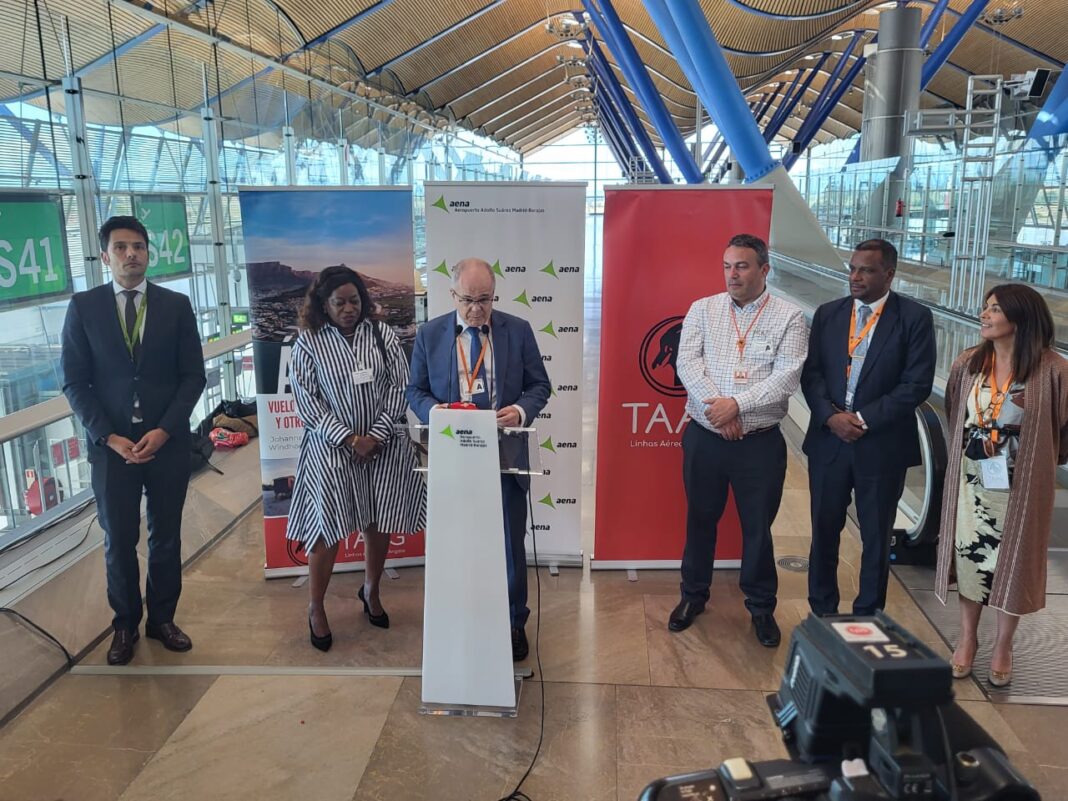CEO (PCE, Presidente da Comissão Executiva, as they say in Angola) of TAAG Angola Airlines since October last year, the executive Eduardo Fairen, seemed quite optimistic when TAAG’s first flight between Luanda and Madrid was celebrated.
On that occasion, Aviacionline managed to take 15 minutes of his time for an interview. With quite straightforward answers, the executive was very comfortable in one of the most difficult positions in aviation. That’s because he has the mission of transforming the airline into a viable business for privatization — a mission entrusted to him by the Angolan government.
Our chat happened before the announcements about the future of TAAG’s fleet, when they ordered, together with Air Lease Corporation (ALC), six Airbus A220-300s to replace their Boeing 737-700s.
Some excerpts were edited for clarity.
Aviacionline (AL): How did you start your history in aviation and how did you get here?
Eduardo Fairen (EF): I was running in a park and suddenly I saw a group of Phantoms passing over my head and I said, I want to get on one of those.
AL: And since then, how did you get here?
EF: After a long career in aviation that started, well, being in the military, flying in the Air Force, then in other companies and then taking administrative positions until you get to the point where you are offered a management position in a big company, right?
AL: Your history in the administrative side [of aviation] is a bit diverse, that is, you worked in Viva…
EF: …I founded Vueling.
AL: …and [now] it seems like a completely different thing to me. So how specifically did you come to TAAG?
EF: There were some people who were looking for a person with a profile of knowing how to carry out successful projects in aviation and so they contacted me. It seemed like a very complicated challenge and I like challenges.
AL: But TAAG seems to me [as] a completely different challenge from all your previous experiences, doesn’t it?
EF: I like challenges, and nobody told me it was impossible so I’m going to try it.
AL: But at the same time your previous experiences, I think, helped you to take this challenge head on, right?
EF: Challenges teach us that things that seem impossible can be done. If you have the right people, you are at the right time and you put in the necessary effort to get things done; that’s what we are doing.
It’s always harder than what’s ahead of us, one always tries to minimize the risk and minimize the amount of challenge. But I still think it’s a challenge that can be done and in that aspect we are all aligned, we are working for it every day.
AL: What is your priority in the short, medium and long term?
EF: In the short term to survive, in the medium term to grow and in the long term to conquer. With discipline, common sense and pragmatism.
AL: How will you achieve this?
EF: Each company has its own path, each one has its own. We believe that TAAG has a very great opportunity right now, given the current situation. Well, in the market and in that part of the world — with the necessary support and the necessary relationships and the vision that we are trying to extend of what we believe has to be an operation after COVID; because COVID has changed us all. That is what we are working on and at the moment the evidence shows that we are making the most appropriate choices.
AL: But your idea is to serve the Angolan market [only], [or is it] to serve the African market?
EF: No, we are going to be — in fact, we already are — a hub and spoke airline and our objective is to be the reference company in Southern Africa. In other words, when someone travels there, they will fly TAAG.
AL: But what is the challenge? SAA is not there, you have no competitor now.
EF: No, there are very strong competitors: Ethiopian and others that are going to enter those markets in a very short time. We have to try to keep and maintain our presence, improve it and do better than them. That is called competition.
AL: But at the same time, wouldn’t it be interesting for you to collaborate with these established companies — or are you just going to compete?
EF: We are doing that. Iberia is an example of a competitor, that is, a potential competitor [with whom] we are making an alliance. We believe in alliances, and we will make alliances wherever it makes sense. Ethiopan may be one of them, [Kenya Airways] may be another… everything will also depend on what these companies have in their strategic plan and vision.
AL: Are you talking to any companies in Africa?
EF: Yes, we are in talks with four companies, two from Africa and two from outside Africa. Clearly I can’t share the names.
AL: And in Europe, are you analyzing other destinations?
EF: We are looking to satisfy the demands of our passengers, our passengers want to go to their final destinations in an easy, concise and well-structured way: not having to arrive at complicated airports, to pick up a suitcase and check in again, miss the flight and all those things that happen. Providing connectivity is fundamental to help and improve the customer experience in these times when flying and traveling is so complicated, because it helps to make it easier.
AL: In that sense, are you already talking to some airports in Europe? I mean, you have not yet talked about flying to Porto, for example?
EF: No, we are not talking with Porto because there is no market. You have to understand what happened in COVID. Before COVID there were some markets that worked and others that did not. After COVID we have seen that there are markets that did not work before that are now fantastic and other markets that worked that have disappeared, because after COVID there has been a very big economic impact and not all regions are reacting with the same strength when it comes to recovering traffic.
AL: How is your traffic mix now compared to before COVID?
EF: It is still loyal. Our passenger is Business and VFR. It has not changed in that sense.
AL: And in Madrid, how are sales so far? Without Iberia you would not be selling so much, would you?
EF: Now we are selling on our own and we are selling at levels that we had already predicted that we would be able to fill, which is around 60, 65%. As soon as the Iberia machine comes in at one hundred percent, well that is clearly going to improve, and maybe we will have to increase frequencies. I don’t know, we will see.
AL: At the same time, that would seem to me to be an incentive to start new destinations in Europe, because if Iberia helps you to fill the flight, so would Lufthansa, right?
EF: Well, for the moment, for the moment, Lufthansa is flying there [to Luanda] and they are taking the passengers they want to take.
AL: But I mean, when you think of new destinations in Europe, Latin America, etcetera, you think of it with partnerships in mind, right?
EF: Sure, yes, of course.
AL: So at this point you couldn’t fill, at least at a profit, a new flight with no codeshare agreements in between.
EF: No, that’s not true, we can, In fact, we are doing some destinations where we don’t need to partner with anybody because we are doing it ourselves.
AL: Looking further back, a few years ago, you had a partnership with Emirates [which] managed the company, didn’t you?
EF: With Emirates? Emirates, Emirates…. ah yes, it is a company that was there in Dubai.
AL: Do you think it is important to resume that partnership or was the fight so strong that it cannot be resumed?
EF: I don’t know what happened before, I just have some headlines and I am dedicated to try to solve the future of TAAG and make it viable. And in that aspect, the conversations are open with anyone who wants to talk and Emirates can be one of them.
AL: In Brazil and in Latin America you have not yet returned to Rio. Is it a possibility or is São Paulo the priority?
EF: At the moment, São Paulo is working. Rio we have to see because the markets in Brazil have also been affected.
AL: But you are not flying daily to Sao Paulo now, are you?
EF: Not yet. In Sao Paulo we are operating with passengers and mainly with cargo.
AL: Where are you going next in Latin America, do you have something in mind or can’t you say?
EF: Yes, but I cannot share.
AL: But it [is] not Rio, because before COVID you were talking about Buenos Aires — but not anymore, right?
EF: Rio is on the list, Buenos Aires is not.
AL: And in terms of cargo you talked about bringing pure freighters.
EF: We are growing in the cargo area. We are growing a lot, but right now there are no full freighters available in the market. We have preighters, but we are looking for pure freighters because we want to make a pure freighter fleet.
AL: You are now bringing in two Boeing 777s. How are they going to work?
EF: They are going to fly from China to Brazil and from Brazil to China, as Preighter. They are coming as part of the Lucky Aviation deal.
04/07/2022: TAAG to source two preighter 777-300ER from Carlyle
AL: In the short-haul market, how do you see the performance of the Dash 8 compared to the 737?
EF: The Dash 8 seems to us to be a very good machine for opening up new markets in sectors of less than an hour to an hour and a quarter. That is where it is flying right now in domestic and we have the Dash fleet right now with a 98% load factor.
AL: And does this transition involve any new routes for the 737?
EF: What we are doing right now is looking for a replacement and we are going to make an announcement at Farnborough.
27/07/2022: Analysis: what’s next for TAAG with their new fleet?
AL: You mean, you already have a signed contract?
EF: We are going to make an announcement at Farnborough.
AL: Now going back to your experience as an executive, what has been your biggest difficulty as TAAG’s CEO so far?
EF: Well, not necessarily as CEO of TAAG; in all the management positions I’ve had, the biggest difficulty is being credible and having people, your team to follow you. That’s always the hardest thing.
AL: Can TAAG be sustainable for the state or is privatization the only way out?
EF: There is no choice: The state has decided that the company is going to be privatized. It has already been decided.
AL: And how are you going to plan for that? Because it seems to me very, very different from your previous experiences.
EF: Well, I have done operations like that before. Now we have three companies that have made an LOI, an expression of interest.
We already have people at the table. We are not in a huge hurry because I think these things need some time to mature, to talk, to evaluate and so on, but clearly the value of TAAG has to go higher and that’s why we are not in a hurry to close either. There are three foreign business groups interested in taking over or being partners in TAAG.
AL: What legacy do you wish to leave at TAAG?
EF: A sustainable company that will continue flying for another 80 years.






